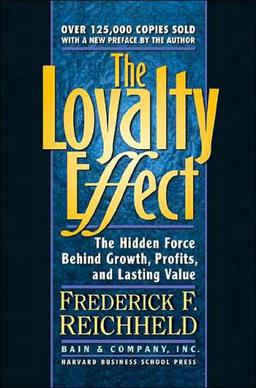Relationship marketing is a form of marketing developed from direct response marketing campaigns that emphasizes customer retention and satisfaction rather than sales transactions. It differentiates from other forms of marketing in that it recognises the long-term value of customer relationships and extends communication beyond intrusive advertising and sales promotional messages. With the growth of the Internet and mobile platforms, relationship marketing has continued to evolve as technology opens more collaborative and social communication channels such as tools for managing relationships with customers that go beyond demographics and customer service data collection. Relationship marketing extends to include inbound marketing, a combination of search optimization and strategic content, public relations, social media and application development.
The loyalty business model is a business model used in strategic management in which a company's resources are employed so as to increase the loyalty of customers and other stakeholders in the expectation that corporate objectives will be met or surpassed. A typical example of this type of model is where quality of product or service leads to customer satisfaction, which leads to customer loyalty, which leads to profitability.
In marketing and consumer behaviour, brand loyalty describes a consumer's persistent positive feelings towards a familiar brand and their dedication to purchasing the brand's products and/or services repeatedly regardless of deficiencies, a competitor's actions, or changes in the market environment. It can also be demonstrated with other behaviors such as positive word-of-mouth advocacy. Corporate brand loyalty is where an individual buys products from the same manufacturer repeatedly and without wavering, rather than from other suppliers. In a business-to-business context, the term "source loyalty" may also be used. Loyalty implies dedication and should not be confused with habit, its less-than-emotional engagement and commitment. Businesses whose financial and ethical values rest in large part on their brand loyalty are said to use the loyalty business model.

The Loyalty Effect is a 1996 book by Fred Reichheld of the consulting firm Bain & Company, and the book's title is also sometimes used to refer to the broader loyalty business model as a whole. Reichheld's book was exceptionally popular with marketing and customer relationship management professionals, and as such the phrase "loyalty effect" has become synonymous in some circles with the more generic concepts covered by the loyalty business model.
Customer satisfaction is a term frequently used in marketing to evaluate customer experience. It is a measure of how products and services supplied by a company meet or surpass customer expectation. Customer satisfaction is defined as "the number of customers, or percentage of total customers, whose reported experience with a firm, its products, or its services (ratings) exceeds specified satisfaction goals." Enhancing customer satisfaction and fostering customer loyalty are pivotal for businesses, given the significant importance of improving the balance between customer attitudes before and after the consumption process.

Net promoter score (NPS) is a market research metric that is based on a single survey question asking respondents to rate the likelihood that they would recommend a company, product, or a service to a friend or colleague. The NPS is a proprietary instrument developed by Fred Reichheld, who owns the registered NPS trademark in conjunction with Bain & Company and Satmetrix. Its popularity and broad use have been attributed to its simplicity and transparent methodology.

Frederick F. Reichheld is an American New York Times best-selling author, speaker and business strategist. He is best known for his research and writing on the loyalty business model and loyalty marketing. He is the creator of the Net Promoter System of management (NPS).
Loyalty marketing is a marketing strategy in which a company focuses on growing and retaining existing customers through incentives. Branding, product marketing, and loyalty marketing all form part of the customer proposition – the subjective assessment by the customer of whether to purchase a brand or not based on the integrated combination of the value they receive from each of these marketing disciplines.
Customer retention refers to the ability of a company or product to retain its customers over some specified period. High customer retention means customers of the product or business tend to return to, continue to buy or in some other way not defect to another product or business, or to non-use entirely. Selling organizations generally attempt to reduce customer defections. Customer retention starts with the first contact an organization has with a customer and continues throughout the entire lifetime of a relationship and successful retention efforts take this entire lifecycle into account. A company's ability to attract and retain new customers is related not only to its product or services, but also to the way it services its existing customers, the value the customers actually perceive as a result of utilizing the solutions, and the reputation it creates within and across the marketplace.
Customer experience, sometimes abbreviated to CX, is the totality of cognitive, affective, sensory, and behavioral customer responses during all stages of the consumption process including pre-purchase, consumption, and post-purchase stages.
Next-best-action marketing is a customer-centric marketing approach that considers the different actions that can be taken for a specific customer and decides on the ‘best’ one.
The Advocacy Index is a customer survey technique developed by VIRTUATel Ltd that is conducted over the telephone. The technique measures customer loyalty using a 3-point scale and is based on the Net Promoter Score (NPS) methodology developed by Fred Reichheld.
Customer advocacy is a specialized form of customer service in which companies focus on what is deemed to be best for the customer. It is a change in a company's culture that is supported by customer-focused customer service and marketing techniques.
Word-of-mouth marketing is the communication between consumers about a product, service, or company in which the sources are considered independent of direct commercial influence that has been actively influenced or encouraged as a marketing effort. While it is difficult to truly control word of mouth communication, there are three generic avenues to 'manage' word of mouth communication for the purpose of word-of-mouth marketing, including:

Active users is a software performance metric that is commonly used to measure the level of engagement for a particular software product or object, by quantifying the number of active interactions from users or visitors within a relevant range of time.
Willingness to recommend is a metric related to customer satisfaction. When a customer is satisfied with a product, he or she might recommend it to friends, relatives and colleagues. This willingness to recommend can be a powerful marketing advantage. In a survey of nearly 200 senior marketing managers, 57 percent responded that they found the "willingness to recommend" metric very useful.
Customer delight means surprising a customer by exceeding their expectations and thus creating a positive emotional reaction. This emotional reaction leads to word of mouth. Customer delight directly affects the sales and profitability of a company, as it helps to distinguish the company and its products and services from the competition. In the past customer satisfaction has been seen as a key performance indicator. Customer satisfaction measures the extent to which the expectations of a customer are met. However, it has been discovered that mere customer satisfaction does not create brand loyalty nor does it encourage positive word of mouth.
EMO Index is a tool which aims to measure the feelings of a customer, a group of customers or stakeholders towards a company, product or service. It serves as an alternative to traditional customer satisfaction research.

Bruce Cooil is The Dean Samuel B. and Evelyn R. Richmond Emeritus Professor of Management at Vanderbilt University in the Owen Graduate School of Management. His main areas of research are statistical modelling and its application to decrease mortality and morbidity rates due to coronary heart disease and what can be done to improve the healthcare of impoverished regions like Mozambique.
A feedback terminal is a physical device that is commonly used to collect large amounts of anonymous real-time feedback from customers, employees, travelers, visitors or students. Typically, feedback terminals feature buttons that users can press to indicate how satisfied they are with the service provided. This information can then be used by organisations to analyze where the experience is optimal, and where it can be improved.





